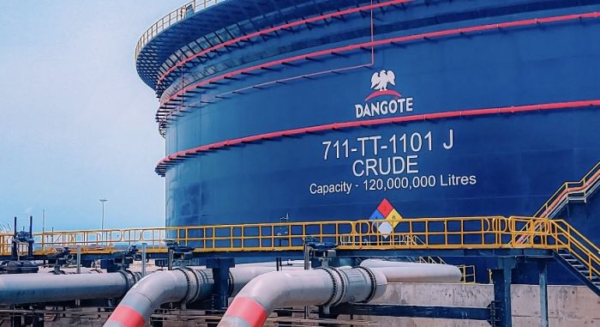The Dangote Petroleum Refinery retained 13% of Nigeria’s crude oil exports as domestic supply in 2024, according to Reuters.
This raised Nigeria’s domestic share of oil exports from 2 percent in 2023 and slightly cut the country’s exports to Europe.
However, despite being a major net exporter of crude, Nigeria imported 47,000 barrels per day of US oil in 2024. Experts say this is unusual for crude oil exporting countries.
The Dangote refinery, alongside other new refineries that sprung up in the global south, has reportedly altered the global flow of crude amidst sanctions on Russian oil and conflict in the Middle East.
Dangote Refinery imported US oil
The 600,000 bpd capacity Dangote Petroleum refinery contributed to the increased volume of Nigeria’s crude imports from the United States. Nairametrics reported that the Dangote refinery received its first shipment of US WTI in November 2024.
The multiple shipments received from the US by the Dangote refinery boosted Nigeria’s imports from the US in 2024 as the Nigerian National Petroleum Company failed to supply crude oil to the refinery.
Global crude exports declined by 2% in 2024
Reuters reported, quoting shipping data, that the volume of global crude export volume in 2024 declined by 2%, the first dip since the COVID-19 pandemic. This is attributed to weak demand growth and reshuffled trade routes due to conflicts, sanctions, and new pipelines and refineries.
• The wars in Ukraine and the Middle East caused a lot of rerouting of tanker shipments, while sanctions on Russia and Iran forced importers in Europe and South America to seek new suppliers.
• Following the outbreak of Russia’s war with Ukraine, European refiners reduced their imports from Russia while boosting purchases of oil from the U.S. and the Middle East. However, attacks on vessels in the Red Sea due to Israel’s war Gaza led to higher shipping costs from the Middle East, so refiners turned to the U.S. and Guyana.
• Iraq’s exports dropped by 82,000 bpd, while the United Arab Emirates saw a decrease of 35,000 bpd. Meanwhile, Europe increased imports by 162,000 bpd from Guyana and 60,000 bpd from the U.S.
• While Europe and South America turned down Russia’s oil, India and China embraced it.
Other factors that have contributed to the reshuffling of oil trade routes include the expansion of Canada’s Trans Mountain pipeline to the country’s west coast, falling oil output in Mexico, and a halt in Libyan oil exports.
Unpredictable 2025
It is hard to predict the global oil market in 2025. Suppliers are doubtful about China’s oil demands in the new year. However, some experts expect demands to rise in India.
Also, more countries are expected to use less oil in the coming years as they turn to gas and renewable energy sources.
In addition, it is not clear whether or not President-elect Donald Trump will relax the sanctions on Iran and Russia.
“This kind of uncertainty and volatility is the new normal – 2019 was the last ‘normal’ year,” Erik Broekhuizen, a marine research and consulting manager at ship brokering firm Poten & Partners told Reuters.
What you should know
• The Dangote Refinery is the largest single-train refinery in Africa and Europe with a capacity to produce 600,000 barrels per day. However, it is not operating at its full capacity yet.
• In addition to domestic supplies, the refinery is also exporting Premium Motor Spirit to various African countries including Cameroon, Angola, Ghana, and South Africa. It also exports diesel and jet fuels to Europe.
• According to the National Bureau of Statistics, Nigeria’s crude oil export was valued at N14,559.56 billion representing 74.98% of total exports in Q2 2024.




